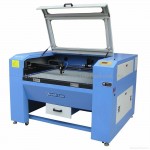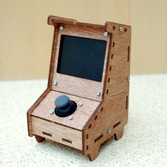Fab Labs & Maker Spaces
Every part of MassArt is a ‘maker space’. More technically, the term ‘Fab lab’ comes from MIT’s Center For Bits and Atoms (CBA) and is based on MIT’s rapid prototyping course, MAS 863: How to Make (Almost) Anything. “The Fab Academy” is a Digital Fabrication Program directed by Neil Gershenfeld which began as an outreach project from the CBA, and has since spread to Fab Labs around the world. The program provides advanced digital fabrication instruction for students through an unique, hands-on curriculum and access to technological tools and resources.” (from the Web site https://fabacademy.org). It also serves as a clearing house and support mechanism for schools and other organizations that want to create Fab Labs using the MIT model. There are hundreds of spaces worldwide.
The MIT Fab Lab model features certain hardware, designed to be affordable. The software is generally free and open source. It features three types of tools: making things by removing material, making things by cutting things out, and making things by additive processes. While it may seem restrictive from our point of view as fine artists and designers, it has the advantage that you can go to almost any city in the world (Chicago, Amsterdam, Wash DC, etc.), find a Fab Lab, and start working right away. Another advantage is that there is a strong emphasis on everyone who uses the facility learning how to use every piece of technology, and as one becomes more experienced, they become the teacher for the next group.
The MIT FabLab model consists of the following hardware:
— Laser Cutter
which makes things like this:
Note: you can also have things made for you – service bureau: www.ponoko.com
— Sign Cutter – cutting vinyl
— CNC Milling Machine
— Large Wood Router
— Electronics Workbench
and, of course,
— 3D Printer which you’ve no doubt all heard about
http://www.makershed.com/3D_Printing_Fabrication_s/220.htm
which makes things like this, an artwork by Nickolay Lamm depicting Barbie in more realistic human proportions:
For small studios, 3D printers currently range in price from $200 for the least expensive one outfitted with a few extra features, to a few thousand. Note: more expensive is NOT automatically better. This is a fast changing world. Machines are generally used to print with cellulose and plastic, but other materials are used as well (carbon fiber, sugar, concrete).
MassArt already has most of this equipment, but not all of it is set up for ‘universal’ access. 3-D printers are currently located in Jewelry/Metals and Industrial Design. We will be adding general access 3-D printers as part of our Universal Tools initiative soon. A wood router is in the Wood Shop, and access is through a Studio Manager. Milling is available in Sculpture, and computer-aided milling on a small scale in Jewelry/Metals. Sewing is available in Fashion and Fibers. 3D Fine Arts recently purchased a plasma cutter for cutting steel. Most of these tools require some special training as well as familiarity with working techniques and shop practice. Sign cutters and other tools are under consideration. Access is primarily for majors, but speak with the Studio Managers.
We have 2 laser cutters which are located in the DMC in room D-311. Priority is given to students, and the room is available during normal College hours. We have a mixture of brokered access, working with a laser staff member, and independent access for trained users.
Electronics is available in North 272 and is a ‘universal tool’ at MassArt. Electronic Projects assistance and access is available to all members of the college community. We can assist with circuit design, projects, multimedia software development, and classes, and we can run workshops. Projects can range from simple, wiring an LED into a sculpture, to complex, such as a full scale interactive installation. Speak with Fred Wolflink (fwolflink@massart.edu or x7290) about electronics, programming, and laser cutter access.
MassArt Universal Tools Web site
Some local facilities and clearing centers:
The MIT model is closely aligned with the South End Technology Center in Boston’s South End, started by Mel King. From the Web site:
“The South End Technology Center @ Tent City (The Tech Center) is a collaborative venture between the Tent City Corporation (TCC) and the Massachusetts Institute of Technology (MIT). Our fundamental purpose is to enable people to become producers of knowledge and sharers of ideas and information. Our scope and methods are as diverse as the people we serve. We provide free or low-cost access and training in most aspects of computer-related technology. The staff, mostly volunteers, have extensive backgrounds in computer technology and their applications.“
http://www.tech-center-enlightentcity.tv/fablab.html
This has developed further with:
AS-220 – an artist-run making space in Providence, RI, comprising several buildings downtown near the convention center. Includes Fab Lab, printing facilities, performances, meetings, art exhibits, food, classes.
FabLab DC: fablabdc.org
Amsterdam: fablab.waag.org
The United States Fab Lab Network Currently, Quinsigamond Community College (http://www.qcc.edu) is the only Massachusetts State University that is part of the network
UMass Lowell has created a Maker Space in their Art & Design program.
UMass Dartmouth is also developing these facilities in the sculpture department in New Bedford.
The Fab Foundation (helps with grants, organizing, etc.): http://www.fabfoundation.org
Another model is the shared studio. There have been various instances of these in Boston, notably DoWhile Studios created by MassArt faculty member Jennifer Hall around 1990 which provided artists access to expensive hardware and software for 3-D animation, and Boston Film & Video Foundation, which provided access to video cameras, studio and editing equipment from the days when access to that equipment was very expensive.
Artisan’s Asylum in Cambridge is a current instance of this model. They offer classes and access to various sorts of equipment as well as studio space. Four week classes typically cost around $120. Their facilities include all of the typical Fab Lab machines as well as many others. they also support projects on a huge scale.
Three new spaces using the shared studio model are The Makery in Brookline Massachusetts, Boston Makers in Jamaica Plain Boston, and Metalwerx in Waltham Massachusetts, a space for jewelry and small metal work.
Public libraries have been getting involved as well. The Hatch Makerspace in Watertown is run by the Watertown library. Access to the facility, tools, and classes is free. It’s a very awesome place. The Boston Public library has 3D printers in several of their branches. Access is brokered by library staff (service bureau model). Files are submitted by email and, if suitable, are printed within a few days.




